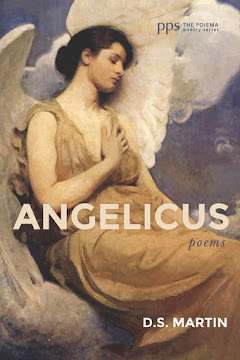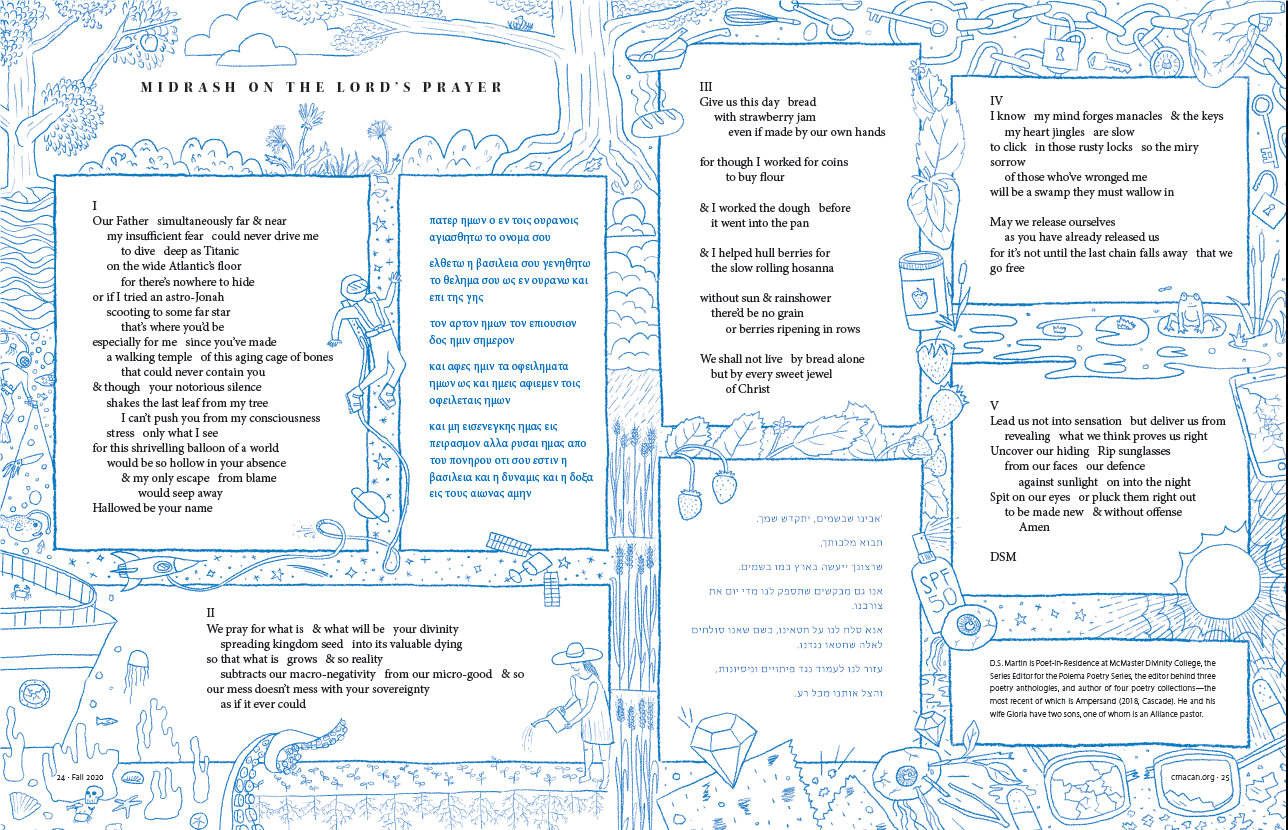Paul Murray is a Dominican priest and poet. He grew up at the foot of the Mountains of Mourne in Northern Ireland, in a house facing the sea. He has lived in Rome since 1994, where he teaches the literature of the mystical tradition ― Catherine of Siena, and John of the Cross, as well as Thomas Aquinas ― at the Pontifical University of St. Thomas Aquinas (a.k.a. The Angelicum).
Murray has written more than a dozen books, besides his poetry titles. Two of his poetry books, The Absent Fountain, and These Black Stars (both published by Dedalus Press) have been combined into the single volume, Stones and Stars (2013). His new collection Moling in Meditation: A Psalter for an Early Irish Monk will be published this year from St. Augustine's Press.
The following poem is from the special issue of Poetry Ireland Review (#112 Name And Nature: ‘Who Do You Say That I Am’) which was edited by John F. Deane.
O Merciful One
When without hope, without aim,
we find ourselves turning and turning
on the outermost rim
of the circumference of our own lives ―
When our hearts are cold, our minds
no longer open to the conviction
of the unseen
or to the sources of that conviction ―
When words which were fiery
once, electrifying the mind and heart,
now seem but a mimicry of
flame, a dazzle of frozen sparks,
burn us with your fire of truth,
with your flame of love.
Posted with permission of the poet.
Entry written by D.S. Martin. His latest poetry collection is Ampersand (2018, Cascade). His books are available through Amazon, and Wipf & Stock, including the anthologies The Turning Aside, and Adam, Eve, & the Riders of the Apocalypse.
Monday, June 28, 2021
Monday, June 21, 2021
Marianne Moore*
Marianne Moore (1887―1972) is a Presbyterian whom the Poetry Foundation calls, “One of America’s foremost poets." In 1918 she moved to New York City, and became an assistant at the New York Public Library. Her poems had started appearing in journals, and then her first collection, Poems (1921), was put together and published by H.D. without her knowledge.
She was widely admired by other poets. In 1925 William Carlos Williams wrote an essay about her, saying that through her particular focus, “in looking at some apparently small object, one feels the swirl of great events.”
T.S. Eliot, wrote in the introduction to her Selected Poems (1935), “Living, the poet is carrying on that struggle for the maintenance of a living language, for the maintenance of its strength, its subtlety, for the preservation of quality of feeling, which must be kept up in every generation … Miss Moore is, I believe, one of those few who have done the language some service in my lifetime.”
And John Ashbery, expressed on the back of the Penguin edition of her Complete Poems (1967), “More than any modern poet, she gives us the feeling that life is softly exploding around us, within easy reach.”
The following poem arises from the opening of Psalm 1.
Blessed Is The Man
who does not sit in the seat of the scoffer―
-------the man who does not denigrate, depreciate, denunciate;
-------------who is not “characteristically intemperate,”
who does not “excuse, retreat, equivocate; and will be heard.”
(Ah, Giorgione! there are those who mongrelize
-------and those who heighten anything they touch; although it may
-------------------well be
-------------that if Giorgione’s self-portrait were not said to be he,
it might not take my fancy. Blessed the geniuses who know
that egomania is not a duty.)
-------“Diversity, controversy; tolerance”―that “citadel
-------------of learning” we have a fort that ought to armor us well.
Blessed is the man who “takes the risk of a decision”―asks
himself the question: “Would it solve the problem?
-------Is it right as I see it? Is it in the best interests of all?”
-------------Alas. Ulysses’s companions are now political―
living self-indulgently until the moral sense is drowned,
having lost all power of comparison,
-------thinking license emancipates one, “slaves who they themselves
-------------------have bound.”
-------------Brazen authors, downright soiled and downright spoiled, as
-------------------if sound
and exceptional, are the old quasi-modish counterfeit,
mitin-proofing conscience against character.
-------Affronted by “private lies and public shame,” blessed is the author
-------------who favors what the supercilious do not favor―
who will not comply. Blessed the unaccommodating man.
Blessed the man whose faith is different
-------from possessiveness―of a kind not framed by “things which
-------------------do appear”―
-------------who will not visualize defeat, too intent to cower;
whose illumined eye has seen the shaft that gilds the sultan’s tower.
*This is the second Kingdom Poets post about Marianne Moore: first post.
Entry written by D.S. Martin. His latest poetry collection is Ampersand (2018, Cascade). His books are available through Amazon, and Wipf & Stock, including the anthologies The Turning Aside, and Adam, Eve, & the Riders of the Apocalypse.
She was widely admired by other poets. In 1925 William Carlos Williams wrote an essay about her, saying that through her particular focus, “in looking at some apparently small object, one feels the swirl of great events.”
T.S. Eliot, wrote in the introduction to her Selected Poems (1935), “Living, the poet is carrying on that struggle for the maintenance of a living language, for the maintenance of its strength, its subtlety, for the preservation of quality of feeling, which must be kept up in every generation … Miss Moore is, I believe, one of those few who have done the language some service in my lifetime.”
And John Ashbery, expressed on the back of the Penguin edition of her Complete Poems (1967), “More than any modern poet, she gives us the feeling that life is softly exploding around us, within easy reach.”
The following poem arises from the opening of Psalm 1.
Blessed Is The Man
who does not sit in the seat of the scoffer―
-------the man who does not denigrate, depreciate, denunciate;
-------------who is not “characteristically intemperate,”
who does not “excuse, retreat, equivocate; and will be heard.”
(Ah, Giorgione! there are those who mongrelize
-------and those who heighten anything they touch; although it may
-------------------well be
-------------that if Giorgione’s self-portrait were not said to be he,
it might not take my fancy. Blessed the geniuses who know
that egomania is not a duty.)
-------“Diversity, controversy; tolerance”―that “citadel
-------------of learning” we have a fort that ought to armor us well.
Blessed is the man who “takes the risk of a decision”―asks
himself the question: “Would it solve the problem?
-------Is it right as I see it? Is it in the best interests of all?”
-------------Alas. Ulysses’s companions are now political―
living self-indulgently until the moral sense is drowned,
having lost all power of comparison,
-------thinking license emancipates one, “slaves who they themselves
-------------------have bound.”
-------------Brazen authors, downright soiled and downright spoiled, as
-------------------if sound
and exceptional, are the old quasi-modish counterfeit,
mitin-proofing conscience against character.
-------Affronted by “private lies and public shame,” blessed is the author
-------------who favors what the supercilious do not favor―
who will not comply. Blessed the unaccommodating man.
Blessed the man whose faith is different
-------from possessiveness―of a kind not framed by “things which
-------------------do appear”―
-------------who will not visualize defeat, too intent to cower;
whose illumined eye has seen the shaft that gilds the sultan’s tower.
*This is the second Kingdom Poets post about Marianne Moore: first post.
Entry written by D.S. Martin. His latest poetry collection is Ampersand (2018, Cascade). His books are available through Amazon, and Wipf & Stock, including the anthologies The Turning Aside, and Adam, Eve, & the Riders of the Apocalypse.
Monday, June 14, 2021
Gillian Allnutt
Gillian Allnutt is an English poet who was presented the Queen’s Gold Medal for Poetry by Queen Elizabeth II in February of 2017. She has published nine collections, including How the Bicycle Shone: New & Selected Poems (2007) and wake (2018) both from Bloodaxe Books.
In a recent review in the Church Times, Martyn Halsall said, “Gillian Allnutt’s spare, elegiac poems are like runes on bone; messages from another world” which is an apt description since her poems are often spare to the point of being obscure. He also said, “These are pilgrim poems, light-footed, and yet dedicated to spiritual quest; ambitious in their intensity; profound in their search for grace…”
The following poems are both from Lintel (2001, Bloodaxe Books).
Meditation
I said to my soul: be still and wait
where the light green sediment collects
at the lake’s near edge.
An old red lifebelt hangs in silence, sedge-
still. Still the long rope,
loosely gathered, loops
on its cast-iron post
like hope, at rest.
The Road Home
It is the road to God
that matters now, the ragged road, the wood.
And if you will, drop pebbles here and there
like Hansel, Gretel, right where
They’ll shine
in the wilful light of the moon.
You won’t be going back to the hut
where father, mother plot
the cul de sac of the world
in a field
that’s permanently full
of people
looking for a festival
of literature, a fairy tale,
a feathered
nest of brothers, sisters. Would
that first world, bared now to the word
God, wade
with you, through wood, into the weald and weather
of the stars?
Entry written by D.S. Martin. His latest poetry collection is Ampersand (2018, Cascade). His books are available through Amazon, and Wipf & Stock, including the anthologies The Turning Aside, and Adam, Eve, & the Riders of the Apocalypse.
In a recent review in the Church Times, Martyn Halsall said, “Gillian Allnutt’s spare, elegiac poems are like runes on bone; messages from another world” which is an apt description since her poems are often spare to the point of being obscure. He also said, “These are pilgrim poems, light-footed, and yet dedicated to spiritual quest; ambitious in their intensity; profound in their search for grace…”
The following poems are both from Lintel (2001, Bloodaxe Books).
Meditation
I said to my soul: be still and wait
where the light green sediment collects
at the lake’s near edge.
An old red lifebelt hangs in silence, sedge-
still. Still the long rope,
loosely gathered, loops
on its cast-iron post
like hope, at rest.
The Road Home
It is the road to God
that matters now, the ragged road, the wood.
And if you will, drop pebbles here and there
like Hansel, Gretel, right where
They’ll shine
in the wilful light of the moon.
You won’t be going back to the hut
where father, mother plot
the cul de sac of the world
in a field
that’s permanently full
of people
looking for a festival
of literature, a fairy tale,
a feathered
nest of brothers, sisters. Would
that first world, bared now to the word
God, wade
with you, through wood, into the weald and weather
of the stars?
Entry written by D.S. Martin. His latest poetry collection is Ampersand (2018, Cascade). His books are available through Amazon, and Wipf & Stock, including the anthologies The Turning Aside, and Adam, Eve, & the Riders of the Apocalypse.
Monday, June 7, 2021
Joanne Epp*
Joanne Epp has just had her second poetry collection launched by Turnstone Books, which is now being celebrated with a “blog tour” ― which is their creative take on advancing a new book during our current pandemic! The book is Cattail Skyline and is her follow-up to her earlier collection Eigenheim.
The landscape captured in these pages is predominantly the Saskatchewan of her youth, both remembered and revisited: a land of railways, buffalo rubbing stones, an ancestral cemetery, pin cherries, chokecherries, raspberries, riverbanks, treaty territory, wild strawberries, cranberries, bunchberries, saskatoon berries, and cattails. There’s also one section about the author’s trip to Cambodia in 1994 with the Mennonite Central Committee.
Epp is a Winnipeg poet who consistently speaks of her perspective on the artform. “I approach poetry as a way of expressing and giving shape to what I encounter in the world,” she said in recent interview with Poetry In Voice. “[W]hile a love of language is essential, poetry also has to come out of a love for the world.”
She serves as assistant organist at St. Margaret's Anglican Church in Winnipeg. The following poem is from Cattail Skyline.
Image in a country church
Horse Lake, Saskatchewan
Sunday, white clapboard unbearably bright.
People shading eyes as they greet
and pass inside to hear the preacher read
the Revelation of John: a lamb standing
as though it had been slain—the paradox
we can hardly speak, the reason
we’ve come and sung, reminded again
how mystery resides in that harsh death,
the rising after, its unnerving glory. It’s here
in this small clearing—that glory, declared
in morning rays through arched windows,
shining the varnished pews;
in brightness flashing out from everything:
white doors, chrome on cars, flecks of mica
in the gravelled yard. Each waxy needle on spruce,
each trembling aspen leaf, each face.
Posted with permission of the poet.
*This is the second Kingdom Poets post about Joanne Epp: first post.
Entry written by D.S. Martin. His latest poetry collection is Ampersand (2018, Cascade). His books are available through Amazon, and Wipf & Stock, including the anthologies The Turning Aside, and Adam, Eve, & the Riders of the Apocalypse.
The landscape captured in these pages is predominantly the Saskatchewan of her youth, both remembered and revisited: a land of railways, buffalo rubbing stones, an ancestral cemetery, pin cherries, chokecherries, raspberries, riverbanks, treaty territory, wild strawberries, cranberries, bunchberries, saskatoon berries, and cattails. There’s also one section about the author’s trip to Cambodia in 1994 with the Mennonite Central Committee.
Epp is a Winnipeg poet who consistently speaks of her perspective on the artform. “I approach poetry as a way of expressing and giving shape to what I encounter in the world,” she said in recent interview with Poetry In Voice. “[W]hile a love of language is essential, poetry also has to come out of a love for the world.”
She serves as assistant organist at St. Margaret's Anglican Church in Winnipeg. The following poem is from Cattail Skyline.
Image in a country church
Horse Lake, Saskatchewan
Sunday, white clapboard unbearably bright.
People shading eyes as they greet
and pass inside to hear the preacher read
the Revelation of John: a lamb standing
as though it had been slain—the paradox
we can hardly speak, the reason
we’ve come and sung, reminded again
how mystery resides in that harsh death,
the rising after, its unnerving glory. It’s here
in this small clearing—that glory, declared
in morning rays through arched windows,
shining the varnished pews;
in brightness flashing out from everything:
white doors, chrome on cars, flecks of mica
in the gravelled yard. Each waxy needle on spruce,
each trembling aspen leaf, each face.
Posted with permission of the poet.
*This is the second Kingdom Poets post about Joanne Epp: first post.
Entry written by D.S. Martin. His latest poetry collection is Ampersand (2018, Cascade). His books are available through Amazon, and Wipf & Stock, including the anthologies The Turning Aside, and Adam, Eve, & the Riders of the Apocalypse.
Subscribe to:
Posts (Atom)






















